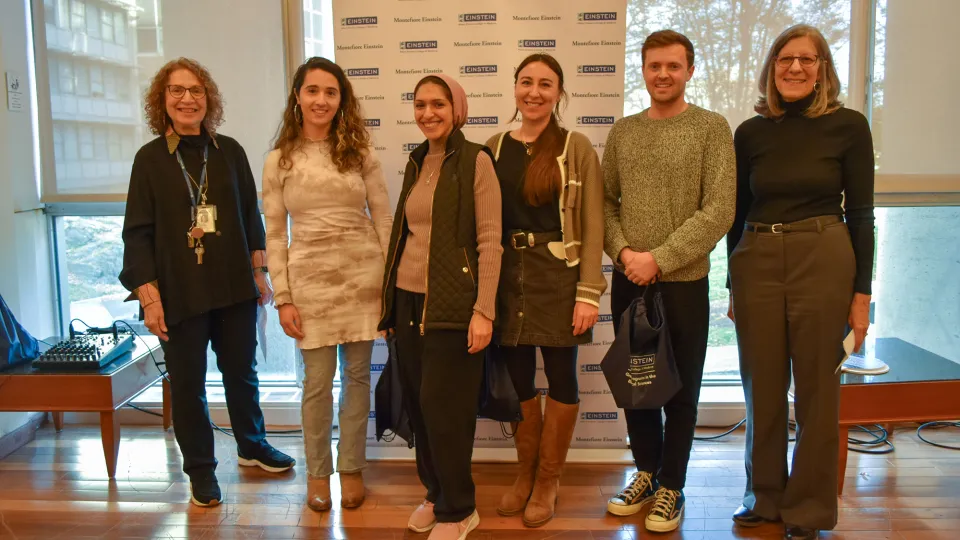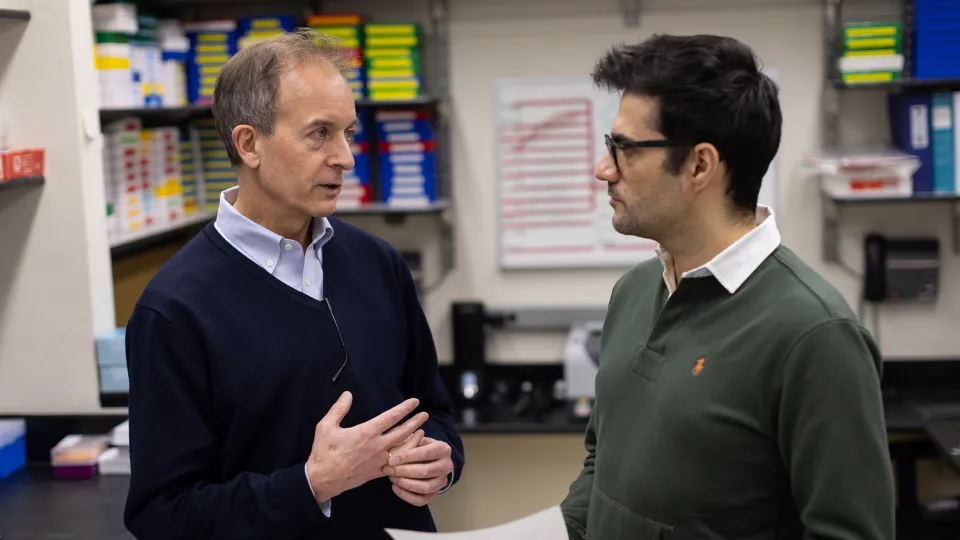
Anne R. Bresnick, Ph.D.
- Professor, Department of Molecular Pharmacology
- Professor, Department of Biochemistry
- Associate Dean for Postdoctoral Affairs
- Associate Director, Cancer Research Training and Education, Montefiore Einstein Comprehensive Cancer
Area of research
- Mechanisms mediating tumor cell migration, invasion and metastasis; development of novel drugs that target cell migration; regulation of the actin-based cytoskeleton
Phone
Location
- Albert Einstein College of Medicine Jack and Pearl Resnick Campus 1300 Morris Park Avenue Forchheimer Building 301 Bronx, NY 10461
Research Profiles
Professional Interests
Mechanisms of Cell Motility and Metastasis
The class II myosins mediate force-requiring cellular functions of such as cell polarization and migration, cell division, the maintenance of cell shape, and remodeling of the actin cytoskeleton. Our work focuses on how protein phosphorylation and noncovalent interactions with novel regulatory proteins mediate the subcellular localization, organization and assembly of myosin-II in normal physiology and disease (including cancer, thrombocytopenia and large platelets, deafness and renal disease).
Phosphorylation of the myosin-II heavy chain regulates filament assembly. Using cell-based assays and animals models of breast cancer, we have shown that heavy chain phosphorylation regulates the invasive capabilities of tumor cells. We are now examining the signaling pathways that regulate heavy chain phosphorylation and the subsequent effects on motility and invasion. We use an interdisciplinary approach that combines biochemistry and structural biology to define the physical and chemical features underlying the regulation of myosin-II assembly by phosphorylation, and molecular and cellular techniques in cultured cells and mouse models to investigate how phosphorylation regulates myosin-II assembly and function in vivo.
We also study S100A4, a member of the S100 family of Ca2+-binding proteins, which is directly involved in tumor metastasis. S100A4 is a key regulator of cell migration and invasion that regulates cell motility by promoting myosin-II disassembly. Notably, S100A4 expression in both tumor cells and in host stromal cells promotes tumor metastasis. We have developed an S100A4 knockout mouse to examine how tumor-associated and stromal S100A4 contribute to metastasis. We use cell culture and animal models, as well as biochemical and structural approaches, to investigate the mechanisms by which S100A4 regulates its protein targets.
Since S100A4 has a direct role in metastatic progression, it is an excellent target for therapeutic intervention. We have developed several assays to identify small molecules that disrupt the interaction of S100A4 with myosin-IIA. We have demonstrated that S100A4 function can be inhibited by a variety of mechanisms, and most importantly, that S100A4 is a “druggable” target. Our efforts are now focused on obtaining high-resolution X-ray structures of S100A4 bound to small molecule inhibitors to identify the chemical and structural determinants involved in S100A4 inhibition, and biochemical and cell-based analyses to evaluate the selectivity and potency of lead compounds. These studies will provide the biochemical and structural foundation for the design of second generation S100A4 inhibitors.
Selected Publications
Dulyaninova NG, Ruiz PD, Gamble MJ, Backer JM, Bresnick AR (2018) S100A4 regulates macrophage invasion by distinct myosin-dependent and independent mechanisms. Mol Biol Cell 29, 632-42.
Bresnick AR, Weber DJ, Zimmer DB (2015) S100 proteins in cancer. Nat Rev Cancer 15, 96-109.
RamagopalU, Dulyaninova NG, VarneyKM, WilderPT, Nallamsetty S, BrenowitzM, Weber DJ, Almo SC, Bresnick AR (2013) Structure of the S100A4/myosin-IIA complex. BMC Struct Biol 13, 31.
Dulyaninova NG, Bresnick AR (2013) The heavy chain has its day: regulation of myosin-II assembly. Bioarchitecture 3, 77-85.
Malashkevich V, Dulyaninova NG, Ramagopal UA, Liriano MA, Varney KM, Knight D, Brenowitz M, Weber DJ, Almo SC and Bresnick AR (2010) Phenothiazines inhibit S100A4 function by inducing protein oligomerization. PNAS 107, 8605-10.
Li Z-H, Dulyaninova NG, House RP, Almo SC and Bresnick AR (2010) S100A4 regulates macrophage chemotaxis. Mol Biol Cell 21, 2598-610.
Dulyaninova NG, House RP, Betapudi V and Bresnick AR (2007) Myosin-IIA heavy chain phosphorylation regulates the motility of MDA-MB-231 carcinoma cells. Mol Biol Cell 18, 3144-55.








